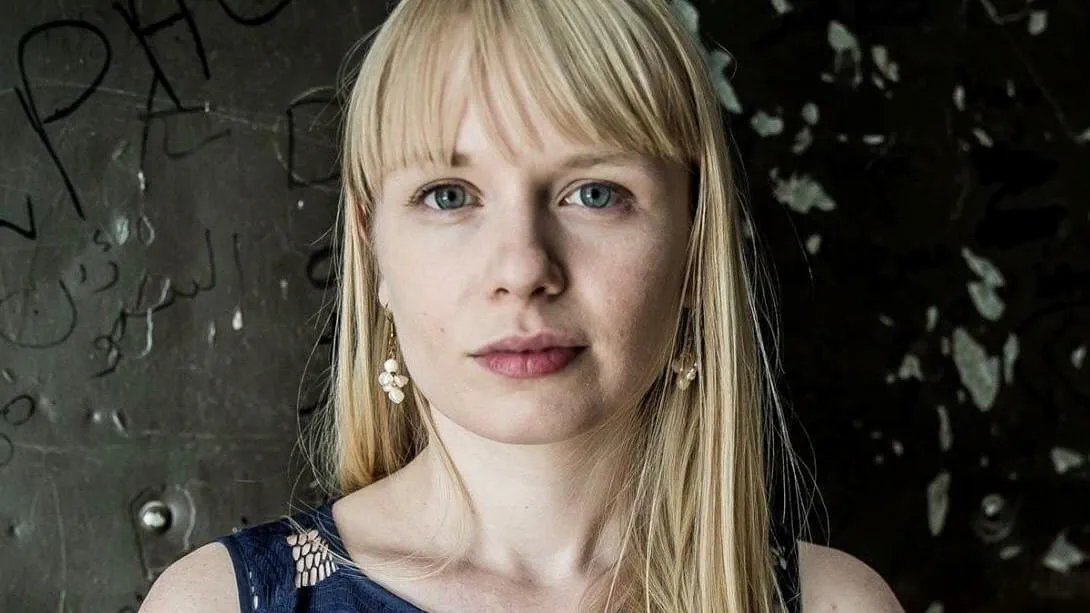Ventures Leader Rebecca Birmingham
Ventures Leader Rebecca Birmingham
Starchitects aside, we hear little about the individuals whose cumulative decisions shape the built environment. In our Profiles in Design series, we chat with engineers, architects, policymakers, and designers about their lives, careers, and daily aspirations.
Rebecca Birmingham, Arup’s Ventures Lead and IP and Digital Counsel in our New York office, discusses the ins and outs of Arup Ventures, our in-house ideation, incubation, and acceleration program; her unique role within Arup’s innovation ecosystem; and the excitement generated by nurturing the next great idea.
Rebecca’s grandfather, Ramon Oliu, at an awards ceremony.
What elements or anecdotes from your background inform the perspectives you have today?
My grandfather was a chemical engineer who immigrated to the United States from Catalunya in the ‘50s. I recently came across his resume from the ‘90s and was surprised by how closely his experience aligns with Arup’s values and my role here. He held four patents and tested the first real-time computer system, and specifically identified his commitment to diversity and inclusion, which I can’t imagine was common in the ‘90s. Under strengths, he listed “utilizing innovation and creativity to identify new product opportunities,” which is exactly what Arup Ventures aims to do. He has always been an inspiration to me, but it wasn’t until recently that I’ve recognized how much his accomplishments influenced my career.
How did you come by your interest in entrepreneurship and innovation?
Before I came to Arup, I was part of the team that founded Newlab, a historic shipbuilding facility in the Brooklyn Navy Yard that we transformed into a space to support innovation. Newlab now supports hundreds of startups building transformative technologies. The Newlab team gained so much from bringing in our first cohort of startups and learning about their work that Newlab became a startup itself in order to grow and scale. That’s where I learned the experiences and challenges startups have as they try to rapidly build a company from the ground up.
What drew you toward Arup as your career developed and how has your path changed within the organization so far?
Newlab and Arup teamed on a proposal for an urban technology innovation hub, so I was able to learn about the breadth of the firm, its legendary projects, its ethos and mission, and also meet some of Arup’s brilliant minds. That got me really interested in the opportunity to help a global organization in the midst of its digital transformation think differently about collaboration with startups and how innovation is incubated internally.
Now that I’ve been with Arup for almost three years, I’ve joined our digital executive and our region’s research committee. This gives me a top-down view of what we’re doing in the region that is at the forefront of innovation and then elevate ideas that might be scalable ventures. That visibility also allows me to guide training efforts and initiatives to ensure all staff are engaged in new ways of doing business and our digital transformation. As Ventures Lead, another major part of my role is supporting external collaborations with a broad range of startups working in the built environment. It’s been such an exciting learning experience to meet startups solving critical challenges and find ways for Arup to shape a better world alongside them.
What role does Ventures play within Arup?
Ventures has a dual role. Internally, we are a resource for those within Arup who have a great idea for a product or new technology that’s digital, physical, or a hybrid. Ventures helps incubate, accelerate, scale, and commercialize those ideas. We bring in subject matter experts from within and outside Arup to provide technical validation and help determine the best commercial model for investment.
Externally, we work closely with our business and skills leaders to identify priority areas where we feel we can make an impact in the built environment. We’ve collaborated with a wide range of startups covering areas including offshore wind, water quality and management, electrification, intelligent mobility, really a wide range of verticals in alignment with Arup’s overall organizational vision. When we find a startup we’re keen to work with, we’re able to bring in the best possible multidisciplinary team to help that company achieve their next critical milestone. For most venture capital firms, technical validation is usually not front of mind — there’s more of a focus on the commercial opportunity. Arup approaches it from another angle. If there are critical technical roadblocks, we want to help solve them early on while supporting scalability.
Arup people love learning about new technologies — it’s part of what makes us tick. Our interest is particularly piqued when there is an idea that we could bring to our clients or implement on our projects to stay at the forefront of emerging sustainable solutions.
How does Arup’s Ventures program differ from other innovation programs and venture capital approaches?
Instead of a one-size-fits-all approach with an application process, we have a concerted outreach program through which we try to reach the best and brightest startups in our areas of interest. Next, after learning about a startup’s value proposition, we focus on the potential technical challenges they’re having to find the best avenues for collaboration. What stumbling blocks are in the way of reaching their next big milestone? Are there things we can do to help them enter a new market? Some of the startups we connect with aren’t yet working in the built environment but would like to be. From there, we talk about what it would look like for us to work together. There are many ways we do this, from joint research, grant pursuits, product development, and by providing global multidisciplinary technical expertise. Our aim is always to support teams who share our values and we enjoy working with.
Another key distinction is that Arup Ventures is not a standard cash investor. Maybe the best way to describe it is that Arup invests intellectual capital rather than writing a check. We’re able to understand a startup’s particular needs to get them to the next step, and ideally our technical validation lends confidence to the next investor. There is a lot of investment money out there right now — we want to go deeper and be an ongoing partner to the startups we work with.
What Ventures-connected ideas or initiatives excite you most?
When it comes to an internal idea that we originally developed in house, I'm very excited about Acorn. Acorn is a suite of transit technologies that uses radio-frequency identification to allow vehicles to communicate with one another and maintain service even if all other communications go down. Compared to existing technologies, like signaling systems on the New York City subway, for instance, Acorn can be installed in a quarter of the time for a third of the cost. We felt Acorn was best served by spinning it off into its own company to grow and scale.
Acorn has now been validated via a scale model and the next step is to put it on a track to pilot the technology with transit authorities. I’ve been reliant on the subway my whole life and would love to have a positive impact on mass transit — it’s such a vital part of creating and connecting livable and equitable cities.
On the partnerships side, we’re working with an organization called First Street Foundation. They provide flood data to residential owners, but they’re now looking to provide more in-depth data to portfolio owners. They’ve partnered with us to leverage our risk and resilience team’s ability to translate that data into measurable financial impacts.
Where are the biggest opportunities for new ideas to make an impact on the built environment?
Climate change and resource scarcity are clearly pressing challenges in need of radical solutions. We're assisting a wide range of startups, and accelerating our own, in areas related to building retrofit technology, risk, resilience, resource management, and renewable energy. These will continue to be priorities for us as we look to shape a better world through scalable technologies.
 ;
;


